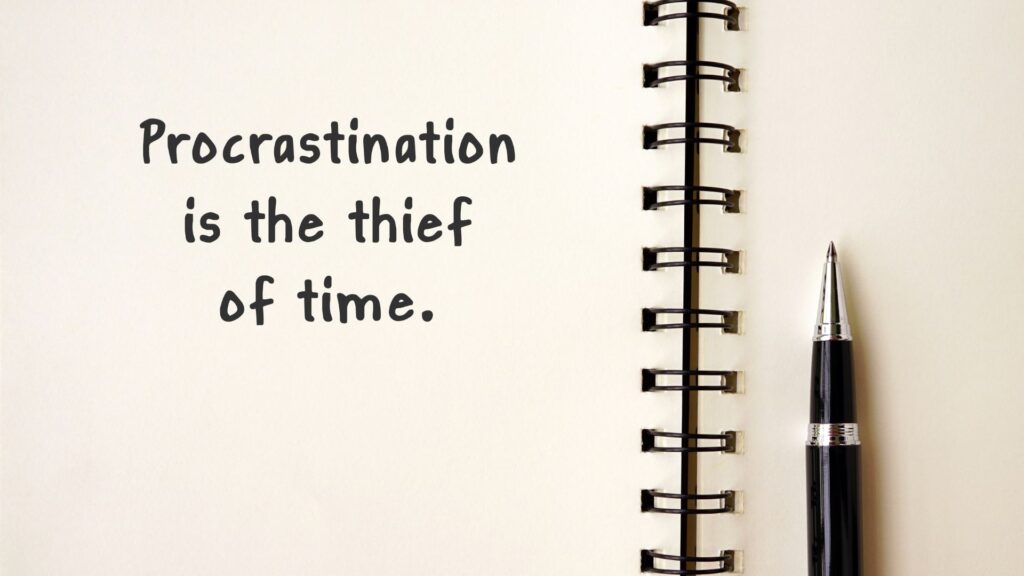Hypnotherapy for Procrastinating
Hypnosis can help stop procrastination because your subconscious mind is more open to positive change.
As Charles Dickens once said “Procrastination is the thief of time”, and this couldn’t be more true. Putting things off is completely normal, and something that many people experience throughout their lives.
From tidying up to running errands, to not getting an important job done, procrastination can be small tasks, or it could be life-changing experiences. Ultimately, procrastinating means that time is wasted and people can end up underachieving, or not fulfilling their goals in life.
Does this sound familiar? It’s important to know you’re not alone.
What if I told you that there are a few steps you can take to stop procrastinating, achieve your life ambitions, and make your life easier for yourself? Just picture how different your life could be.
In this article, we’ll look at what procrastination is, hypnotherapy for procrastination, the causes of procrastination, and if hypnosis can help you stop procrastinating.

What is Procrastination?
Simply put, procrastination is the act of delaying or postponing something. Putting something off that we don’t want to do is very common, and at some level, procrastinators know that they’re aware of their actions.
Many people will do something easier, or less important instead of the main task at hand. Despite knowing that you’re voluntarily avoiding something and that there will be negative consequences, procrastination is one of the main barriers to avoid you getting up, and making the right decisions.
Examples of procrastination:
- Starting an important task, then doing something else instead (e.g. making a coffee)
- Waiting for the ‘right time’ to complete a task
- Filling your time with non-important, easy tasks
- Not making a decision on something
- Leaving an important task on your to-do list for a long time
As a result of procrastinating you may find that you’re:
- Wasting time
- Not getting things done
- Feeling overwhelmed
- Missing deadlines
- Missing personal and business opportunities
- Struggling with self-confidence
If we procrastinate over a long period of time, we can become demotivated, and have a lack of productivity. In turn, this can lead to anxiety, stress and depression.
If you find that this behaviour is affecting your life, it may be time to make a change.
Take a look at this video about procrastination, how you can stop procrastinating, and take action.
What is the Main Cause of Procrastination?
There are many reasons why people procrastinate, and there’s a chance that someone is suffering from an underlying issue that they may not be aware of.
This usually happens when we fear a challenging task. To avoid these negative feelings, people will do something else that makes them feel better temporarily.
Is Procrastination The Same As Being Lazy?
A lot of people view putting off tasks as being lazy, but procrastination can affect all types of people, and laziness is not always the case. Procrastination is an active process, as you choose to do something instead of the task you should be doing.
For example, a hardworking employee may put off applying for a job or promotion from a lack of self-confidence, or self-doubt from fear of failing.
Our subconscious is there to protect us to keep us feeling safer. When people feel like they can’t achieve something, it feels more comfortable not to try and you won’t have the disappointment of failure.
Surprisingly, perfectionists are often procrastinators as they choose to avoid a task they don’t believe they have the skills for, rather than do it imperfectly.
But it’s important to remember that confidence, overcoming challenges, and even failing at times are what make people grow, develop and achieve their life ambitions.
Remember that whatever your goals are, you can achieve them. Follow simple steps, and if professional help is what you need to stop procrastinating, a trained hypnotherapist and coach can help you overcome this issue.

How To Stop Procrastination with Hypnosis
Addressing the fact that you are procrastinating is the first step to making a positive change. Remember that it is normal to procrastinate, and it’s important to know that you’re not alone.
Procrastination is not a mental health issue, but there are simple changes you can make to ensure that the problem doesn’t become anxiety, depression, or any long-term health problems.
It’s important to note that procrastination could be a sign of a serious mental health condition such as anxiety, depression, OCD, or ADHD. If you suffer from chronic procrastination, you should seek the help of a trained professional.
Procrastination is a habit, and therefore it’s not something that can be broken overnight. Breaking a pattern of behaviour can be done when you stop practising them.
There are things you can do to help avoid procrastinating. We’ve listed our top tips below.
How to Overcome Procrastination
Plan your day in advance
Writing your to-do list for the day, with the jobs you need to complete is a great tool to ensure that you get everything finished. Once you have your list, commit to all tasks and focus on doing, not avoiding jobs.
Break tasks down into smaller tasks
Set small goals and break big tasks into manageable, smaller tasks. Often, the thought of completing one large task can seem overwhelming, but smaller tasks will be much easier to work with.
Stay on top of tasks
When something needs to be done, tackle the task straight away rather than leaving it for another day and letting things build up.
Prioritise the hardest tasks first
Aim to start your day with the most difficult tasks at hand. You’ll feel better for the rest of the day once the job is complete, and you’ll have the rest of the day for more enjoyable tasks.
Motivate yourself with a small reward
Reward yourself with a treat when you finish a large task. It could be something as simple as a coffee with a friend, or a slice of cake, but it’ll feel good to motivate yourself with a small reward.
Forgive yourself
Self-forgiveness from procrastinating in the past can help you feel much better, more positive about yourself, and reduce procrastination in the future.
Remove distractions
Turn off the TV, don’t check emails and put your phone in another room to avoid checking social media.
Try as many of these strategies to give yourself the best possible chance of success.
It may be that you put things off because you’re unorganised. In this case, try our tips below.
- Use to-do lists
- Tackle your hardest tasks first thing in the morning
- Set goals and deadlines to complete tasks
- Use time management apps such as Trello
- Break down tasks into smaller, more management tasks
Can Hypnotherapy Help Me To Stop Procrastinating?
If you’re finding that none of the above tips works for you, your procrastination may require professional help.
Hypnotherapy for procrastinating has helped many people, and hypnosis will also look at why you procrastinate. Often there’s a good reason such as not wanting to fail at work, not wanting to get hurt in a relationship, or not wanting to commit to something for lack of confidence.
Hypnosis can help people feel like themselves again, and help people reach their goals – both personal and professional. However, hypnotherapy can only work if a person is motivated and willing to change.
Hypnotherapists use their knowledge and experience to enter a person’s subconscious mind to change their frame of mind, get rid of unwanted habits, and change their perspective on life.
By changing your mindset, tasks can become effortless and easy to do so procrastination will end. Not only will hypnotherapy address your underlying issue of procrastinating and lack of motivation, but it’ll also help in many other areas of your life.
Advanced hypnosis also helps people to improve their self-confidence, sleep, relationships, stress, work-life balance, health and well-being and have a better outlook on life.
Hypnotherapy is an excellent technique to overcome procrastination. There are many hypnotherapists in the world, but it’s important to find a trained, and experienced hypnotherapist who you connect with to see long-lasting, positive results.
How Does Hypnosis Work?
Our minds have a conscious state and a subconscious state. We use the conscious part of our mind to make decisions, act and think. On the other hand, our subconscious mind controls our habits and even influences our behaviour.
Hypnosis is where the conscious part of your mind becomes relaxed and easily distracted. This can be compared to when you daydream and enter a trance-like state. Or, when you’re doing something that has become second nature such as driving a familiar route on your way to work.
Hypnotherapy works as your mind is open to communication. During hypnosis, you are simply unreceptive to messages that are contradictory to your negative values.
You’re always in full control during hypnosis, and a person can snap out of the subconscious state at any moment. Hypnotherapy is completely safe, and a natural technique used to overcome limiting beliefs.

Online Hypnosis for Procrastination
Online hypnosis for procrastination is incredibly effective and is the same as face-to-face hypnotherapy. It’s 100% safe, efficient, and convenient for many people.
With the rise of people using Zoom, FaceTime and Skype, counselling, therapy, coaching and hypnotherapists have followed suit to allow people to stay in the comfort of their own homes.
Online hypnosis also allows people to connect with hypnotherapists from all over the world, rather than someone local to them.
Many people wonder if online hypnotherapy for procrastination can be as powerful as in-person sessions, but there is no difference. As long as the patient trusts the practitioner, and is open to being hypnotised, anyone can open their mind to the natural power of hypnotherapy.
Read more about how online hypnotherapy works here.
FAQs about Hypnosis for Procrastination
Many people believe that procrastination is a form of laziness, however, people often procrastinate from fear of failing or not believing they’re good enough. Hypnotherapy can help change your beliefs, and make positive changes so you feel more motivated and determined to succeed in your goals.
Procrastination can be helped with simple strategies and organisation, but there may be a deeper meaning behind why you procrastinate. If you’re unable to overcome procrastination on your own, professional help such as a trained hypnotherapist will be able to help.
Hypnotherapy is a great tool to help overcome procrastination, and will also identify the root cause of why you procrastinate in the first place.
Yes, hypnosis can help with procrastination. Hypnotherapy has helped many people overcome procrastination as their mind is more responsive to positive suggestions and change limiting beliefs which causes procrastination in the first place. Hypnosis will also look at why you procrastinate in the first place. For example, you’re procrastinating for the fear of failing at work, or not wanting to get hurt in a relationship.
Summary of Hypnosis for Procrastination
The first step to overcoming procrastination is to recognise that you’re putting things off in the first place. Next, it’s important to identify the reasons behind your behaviour pattern and use appropriate strategies to manage and overcome the habit.
Hypnotherapy for procrastination will not only put an end to your procrastinating, but it will also identify the root cause of why you’re procrastinating in the first place. Procrastination is something we often do to cope with negative thoughts, and emotions.
Often, people need professional help to identify the hidden reason and learn tools to help manage their limiting beliefs.
If you’d like to seek professional help regarding your procrastination, expert Stuart Downing from Hypnotherapy 4 Freedom has helped hundreds of people overcome their negative barriers.
Get in touch today for a free 30-minute consultation to find out how hypnotherapy works, and if I’m the right hypnotherapist for you.
It’s time to get started on the path to building your new life and achieving your dreams that you never thought were possible.
My name is Stuart Downing and I am an experienced hypnotherapist working to help people overcome any addictions, sleep issues, phobias, or mental health issues using the power of their own minds.
I offer private hypnosis sessions all over the UK from hypnotherapy in Birmingham, to hypnotherapy in London and internationally through online hypnosis. Wherever you are in the world, I’d love to help you. Get in touch today.
Related Hypnotherapy Articles:
- Does Hypnotherapy Work for Weight Loss?
- Does Hypnotherapy for Anxiety Work?
- How Does Hypnotherapy Work Online on Zoom?
